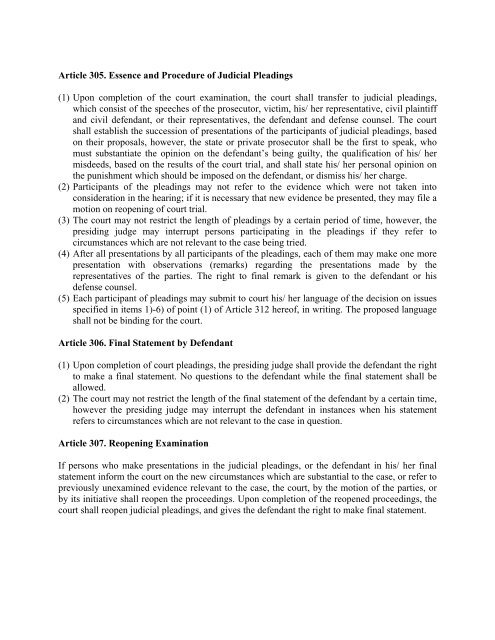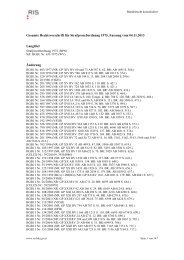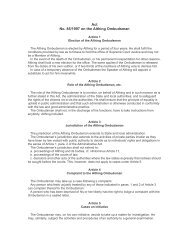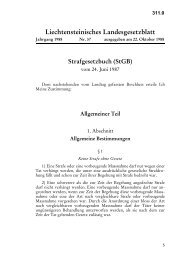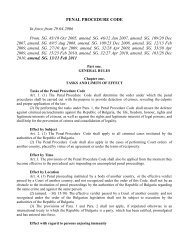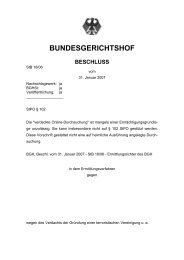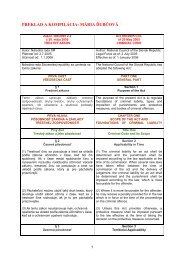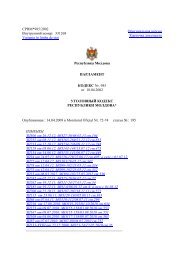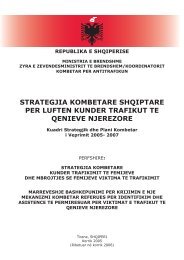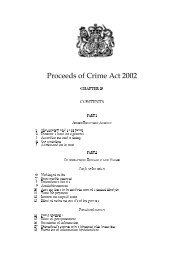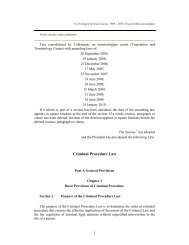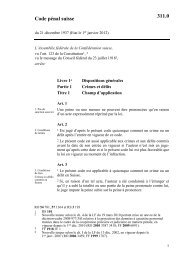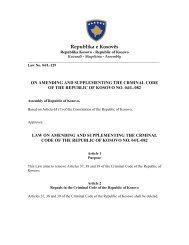Criminal Procedure Code of the Kyrgyz Republic - Legislationline
Criminal Procedure Code of the Kyrgyz Republic - Legislationline
Criminal Procedure Code of the Kyrgyz Republic - Legislationline
You also want an ePaper? Increase the reach of your titles
YUMPU automatically turns print PDFs into web optimized ePapers that Google loves.
Article 305. Essence and <strong>Procedure</strong> <strong>of</strong> Judicial Pleadings<br />
(1) Upon completion <strong>of</strong> <strong>the</strong> court examination, <strong>the</strong> court shall transfer to judicial pleadings,<br />
which consist <strong>of</strong> <strong>the</strong> speeches <strong>of</strong> <strong>the</strong> prosecutor, victim, his/ her representative, civil plaintiff<br />
and civil defendant, or <strong>the</strong>ir representatives, <strong>the</strong> defendant and defense counsel. The court<br />
shall establish <strong>the</strong> succession <strong>of</strong> presentations <strong>of</strong> <strong>the</strong> participants <strong>of</strong> judicial pleadings, based<br />
on <strong>the</strong>ir proposals, however, <strong>the</strong> state or private prosecutor shall be <strong>the</strong> first to speak, who<br />
must substantiate <strong>the</strong> opinion on <strong>the</strong> defendant’s being guilty, <strong>the</strong> qualification <strong>of</strong> his/ her<br />
misdeeds, based on <strong>the</strong> results <strong>of</strong> <strong>the</strong> court trial, and shall state his/ her personal opinion on<br />
<strong>the</strong> punishment which should be imposed on <strong>the</strong> defendant, or dismiss his/ her charge.<br />
(2) Participants <strong>of</strong> <strong>the</strong> pleadings may not refer to <strong>the</strong> evidence which were not taken into<br />
consideration in <strong>the</strong> hearing; if it is necessary that new evidence be presented, <strong>the</strong>y may file a<br />
motion on reopening <strong>of</strong> court trial.<br />
(3) The court may not restrict <strong>the</strong> length <strong>of</strong> pleadings by a certain period <strong>of</strong> time, however, <strong>the</strong><br />
presiding judge may interrupt persons participating in <strong>the</strong> pleadings if <strong>the</strong>y refer to<br />
circumstances which are not relevant to <strong>the</strong> case being tried.<br />
(4) After all presentations by all participants <strong>of</strong> <strong>the</strong> pleadings, each <strong>of</strong> <strong>the</strong>m may make one more<br />
presentation with observations (remarks) regarding <strong>the</strong> presentations made by <strong>the</strong><br />
representatives <strong>of</strong> <strong>the</strong> parties. The right to final remark is given to <strong>the</strong> defendant or his<br />
defense counsel.<br />
(5) Each participant <strong>of</strong> pleadings may submit to court his/ her language <strong>of</strong> <strong>the</strong> decision on issues<br />
specified in items 1)-6) <strong>of</strong> point (1) <strong>of</strong> Article 312 here<strong>of</strong>, in writing. The proposed language<br />
shall not be binding for <strong>the</strong> court.<br />
Article 306. Final Statement by Defendant<br />
(1) Upon completion <strong>of</strong> court pleadings, <strong>the</strong> presiding judge shall provide <strong>the</strong> defendant <strong>the</strong> right<br />
to make a final statement. No questions to <strong>the</strong> defendant while <strong>the</strong> final statement shall be<br />
allowed.<br />
(2) The court may not restrict <strong>the</strong> length <strong>of</strong> <strong>the</strong> final statement <strong>of</strong> <strong>the</strong> defendant by a certain time,<br />
however <strong>the</strong> presiding judge may interrupt <strong>the</strong> defendant in instances when his statement<br />
refers to circumstances which are not relevant to <strong>the</strong> case in question.<br />
Article 307. Reopening Examination<br />
If persons who make presentations in <strong>the</strong> judicial pleadings, or <strong>the</strong> defendant in his/ her final<br />
statement inform <strong>the</strong> court on <strong>the</strong> new circumstances which are substantial to <strong>the</strong> case, or refer to<br />
previously unexamined evidence relevant to <strong>the</strong> case, <strong>the</strong> court, by <strong>the</strong> motion <strong>of</strong> <strong>the</strong> parties, or<br />
by its initiative shall reopen <strong>the</strong> proceedings. Upon completion <strong>of</strong> <strong>the</strong> reopened proceedings, <strong>the</strong><br />
court shall reopen judicial pleadings, and gives <strong>the</strong> defendant <strong>the</strong> right to make final statement.


